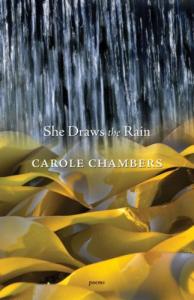Roomie Candace Fertile reviews Carole Chambers’ fifth book of poetry, She Draws the Rain.
The sense of place infuses Carole Chambers’ fifth book of poetry. The pages are full of the rain and trees of Hornby Island, off the west coast of B.C. Many of the poems are about connections, either with the beauty and fecundity of the landscape or the friends and relatives who share it.
The title poem is dedicated to Elizabeth Macdonald, who also took the cover photograph, a gorgeous image titled bull kelp. The poem has an odd beginning: “It was a dead / boring Sunday” and then continues to tell the story of two friends and a dog out in the rain. One is successful: “she, / raised on the prairie / where the sky is the sea, / drew the rain exquisitely.” The speaker’s boredom is contradicted by what happens, but at the end she is still experiencing “ennui” while seeing beauty in her friend’s drawing.
Overall the longer poems in this collection work better as they offer the chance to slide into the space and sound and revel in both. “The Forest,” a six-page celebration of a couple’s hike into an area once logged and an abandoned homestead has beautiful description, “We climb under the green roof / of summer, a breeze idling / in the tops of maples and alders,” and a sensitive consideration of the deteriorating house: “No ghost remains / of the people who dwelt here, / just the healing of a scar.” And the couple continues further into the forest into “vast receding galleries / of ancient cedar trunks / shot through / with pale columns of light.” When Chambers moves through the forest, her steps and her words are sure.
In “A Poem for Jesus (from a Pantheist),” Chambers manages in two pages to capture her belief in the magic and mysticism of the forest: “When every tree / is the Rood, resurrected. / Jubilate.” That belief is weirdly undercut by the four-page poem “Paradise,” which deals with the creation of Adam and Eve. This poem feels out of place in this collection as its subject and jokey tone (“God let off a little steam”) disrupt the seriousness and beauty of the rest of the book.
In a few poems, Chambers moves away from the Hornby setting, and does so gracefully and sadly. For example, “Exile” describes the perilous journey of a Lama and twenty monks from Tibet, trying to escape persecution. This poem indelibly marks the sense of loss: “There are rituals of courtesy, / rituals of hospitality, / of respectfulness, / there are rituals of obedience / and worship, / but none for leaving.” Leaving home causes heartbreak and can result in death.
Persecution is also dealt with in “Beautiful Bones,” which shows the horror of a family’s separation, mother and son incarcerated in a camp, father “sent to Hell / on the Burma road to break his / back and his fine ideas / and turn to dust.” Chambers can see the kindness and cruelty in the world, but she dwells more in the land of kindness.
This collection offers a range of emotion and acceptance of the varieties of human experience while presenting a strong belief in the interconnections of landscape and life.














